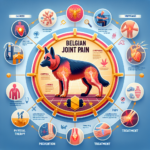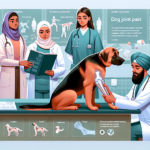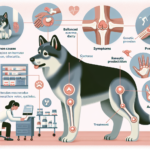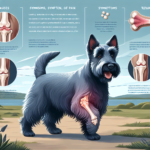Affenpinscher Joint Pain: Causes, Symptoms, Prevention, and Treatment
Introduction
The Affenpinscher, often referred to as the “Monkey Terrier,” is a small but sturdy breed known for its distinctive facial expression and lively personality. Originating in Germany, the Affenpinscher was initially bred to be a ratter, keeping homes and stables free of rodents. Over time, they transitioned into beloved companion animals, admired for their intelligence, loyalty, and playful nature. Despite their small size, Affenpinschers are robust and energetic, making them a delightful addition to many households.
Like all breeds, Affenpinschers are prone to certain health issues. Common concerns include respiratory problems, dental issues, and, notably, joint pain. Joint health is a critical aspect of overall well-being for Affenpinschers, as joint pain can significantly impact their quality of life. Understanding the causes, symptoms, prevention, and treatment of joint pain in Affenpinschers is essential for ensuring they lead happy, active lives.
Breed-Specific Joint Pain Risks
Genetic Predisposition
Affenpinschers, like many purebred dogs, have a genetic predisposition to certain joint-related issues. Hip dysplasia, a condition where the hip joint doesn’t fit properly into the hip socket, is one such concern. This misalignment can lead to arthritis and significant pain over time. Additionally, Affenpinschers may be prone to patellar luxation, where the kneecap dislocates from its normal position, causing discomfort and mobility issues.
Age-Related Risks
As Affenpinschers age, the risk of developing joint pain increases. Degenerative joint diseases such as osteoarthritis are common in older dogs, leading to stiffness, pain, and reduced mobility. For Affenpinschers, joint issues may start to appear as early as middle age, around 6-8 years old. Regular veterinary check-ups are crucial during these years to monitor joint health and catch any issues early.
Activity Level and Joint Stress
Affenpinschers are known for their high energy levels and playful nature. While regular exercise is essential for their overall health, excessive or inappropriate activity can put undue stress on their joints. Activities that involve a lot of jumping or sudden stops and starts can be particularly hard on their joints. It’s important to balance their need for exercise with activities that are gentle on their joints.
Common Symptoms of Joint Pain in Affenpinschers
General Symptoms
- Limping: One of the most noticeable signs of joint pain is limping or favoring one leg over another.
- Stiffness: Stiffness, especially after rest or sleep, can indicate joint pain.
- Reluctance to Move: A dog in pain may be reluctant to climb stairs, jump onto furniture, or go for walks.
- Decreased Activity: A decrease in overall activity levels or enthusiasm for play can be a sign of discomfort.
- Behavioral Changes: Irritability, aggression, or withdrawal can also be indicators of pain.
Breed-Specific Symptoms
In Affenpinschers, joint pain may manifest in specific ways due to their size and build. Owners might notice a “bunny hopping” gait, where the dog uses both hind legs together when running. Additionally, Affenpinschers may show signs of discomfort when being picked up or handled, particularly around the hindquarters.
When to Consult a Vet
If you observe any of the above symptoms in your Affenpinscher, it’s important to consult a veterinarian promptly. Early intervention can prevent further deterioration and improve your dog’s quality of life. Persistent limping, noticeable pain when moving, or significant changes in behavior should all prompt a veterinary visit.
Preventive Measures for Joint Health
Exercise Recommendations
Regular, moderate exercise is key to maintaining joint health in Affenpinschers. Activities such as walking, swimming, and gentle play are excellent choices. Avoid high-impact activities like jumping or running on hard surfaces. Short, frequent walks are preferable to long, strenuous ones. Always warm up your dog with a gentle walk before engaging in more vigorous activities.
Dietary Suggestions
A balanced diet rich in essential nutrients can support joint health. Look for dog foods that contain glucosamine and chondroitin, which help maintain cartilage health. Omega-3 fatty acids, found in fish oil supplements, can reduce inflammation and support joint function. Always consult your veterinarian before adding supplements to your dog’s diet.
Weight Management
Maintaining a healthy weight is crucial for reducing joint stress. Excess weight puts additional pressure on the joints, exacerbating pain and discomfort. Monitor your Affenpinscher’s weight closely and adjust their diet and exercise routine as needed. Your veterinarian can provide specific guidelines for maintaining an ideal weight.
Early Screening and Monitoring
Regular veterinary check-ups are essential for early detection of joint issues. Your vet may recommend specific screening tests, such as X-rays or joint fluid analysis, to assess joint health. Early diagnosis allows for timely intervention, which can slow the progression of joint diseases and improve your dog’s quality of life.
Treatment Options for Joint Pain
Non-Surgical Treatments
Non-surgical treatments are often the first line of defense against joint pain. These may include:
- Medications: Nonsteroidal anti-inflammatory drugs (NSAIDs) can reduce pain and inflammation. Other medications, such as corticosteroids or pain relievers, may also be prescribed.
- Physical Therapy: Physical therapy can improve joint function and reduce pain. Techniques may include massage, stretching, and controlled exercise.
- Lifestyle Adjustments: Modifying your dog’s activity level and providing a comfortable living environment can help manage pain.
Surgical Options
In severe cases, surgical intervention may be necessary. Common surgical options for joint pain include:
- Joint Replacement: Total hip replacement or other joint replacement surgeries can provide significant relief for dogs with severe joint damage.
- Arthroscopy: A minimally invasive procedure that allows the surgeon to clean out the joint and remove damaged tissue.
- Osteotomy: A surgical procedure that involves cutting and realigning bones to improve joint function.
Alternative Therapies
Alternative therapies can complement traditional treatments and provide additional relief. These may include:
- Acupuncture: Acupuncture can reduce pain and inflammation by stimulating specific points on the body.
- Hydrotherapy: Water-based exercises can improve joint function without putting stress on the joints.
- Massage: Regular massage can reduce muscle tension and improve circulation, helping to alleviate pain.
Lifestyle and Management Tips
Daily Care Routine
A consistent daily care routine can help manage joint pain in Affenpinschers. This might include:
- Short, gentle walks multiple times a day.
- Regular, low-impact play sessions.
- Administering any prescribed medications or supplements.
- Providing a balanced diet to support overall health.
Modifying the Home Environment
Making your home more comfortable for a dog with joint pain can significantly improve their quality of life. Consider the following modifications:
- Use ramps or steps to help your dog access furniture or climb stairs.
- Provide orthopedic beds that offer extra support and cushioning.
- Ensure food and water bowls are at a comfortable height to reduce strain.
Long-Term Management
Long-term management of joint pain involves ongoing care and monitoring. Regular veterinary check-ups, consistent exercise, and a healthy diet are all essential components. Additionally, staying informed about new treatments and therapies can help you provide the best care for your Affenpinscher.
FAQs About Affenpinschers and Joint Pain
What are the early signs of joint pain in Affenpinschers?
Early signs of joint pain include limping, stiffness, reluctance to move, and decreased activity levels. Behavioral changes such as irritability or withdrawal can also indicate discomfort.
Can joint pain in Affenpinschers be prevented?
While genetic predispositions cannot be entirely prevented, maintaining a healthy weight, providing appropriate exercise, and regular veterinary check-ups can help reduce the risk and severity of joint pain.
Are there specific exercises that are better for Affenpinschers with joint pain?
Low-impact exercises such as walking and swimming are ideal for Affenpinschers with joint pain. Avoid high-impact activities that involve jumping or sudden movements.
What dietary supplements can help with joint health?
Supplements containing glucosamine, chondroitin, and omega-3 fatty acids can support joint health. Always consult your veterinarian before adding supplements to your dog’s diet.
When should I consider surgery for my Affenpinscher’s joint pain?
Surgery is typically considered when non-surgical treatments are no longer effective, and the dog’s quality of life is significantly impacted. Your veterinarian can help determine the best course of action based on your dog’s specific condition.
Conclusion
Joint pain is a common concern for Affenpinschers, but with proper care and attention, it can be managed effectively. Understanding the causes, symptoms, prevention, and treatment options is essential for ensuring your Affenpinscher leads a happy, active life. Regular veterinary check-ups, a balanced diet, appropriate exercise, and a comfortable living environment are all crucial components of joint health. By taking proactive measures and staying informed, you can help your Affenpinscher enjoy a pain-free and fulfilling life.




